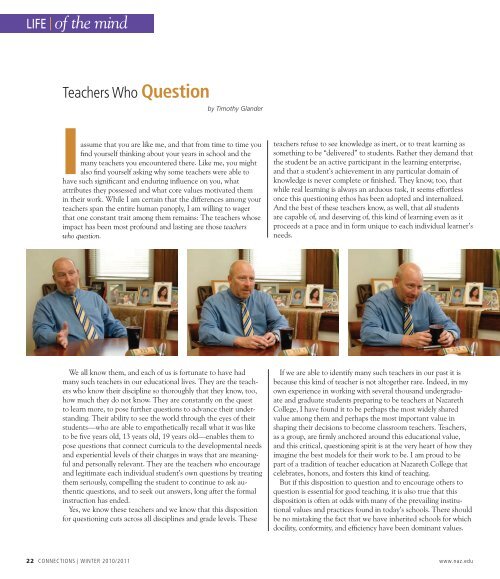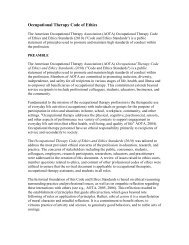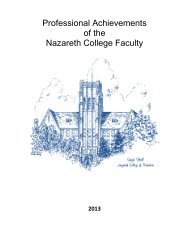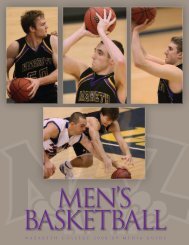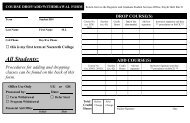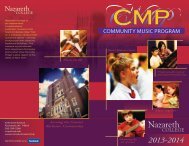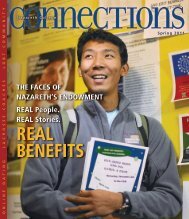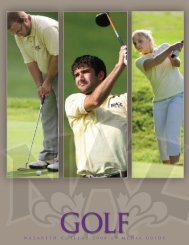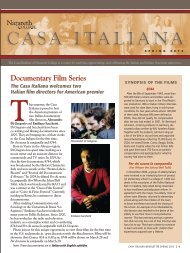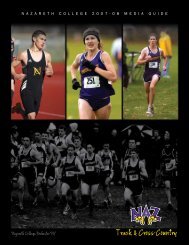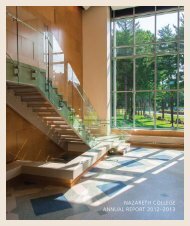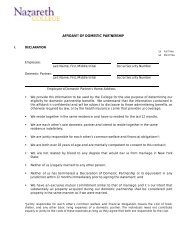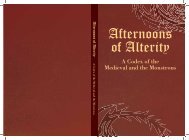china connections - Nazareth College
china connections - Nazareth College
china connections - Nazareth College
Create successful ePaper yourself
Turn your PDF publications into a flip-book with our unique Google optimized e-Paper software.
LIFE | of the mind<br />
Teachers Who Question<br />
by Timothy Glander<br />
Iassume that you are like me, and that from time to time you<br />
find yourself thinking about your years in school and the<br />
many teachers you encountered there. Like me, you might<br />
also find yourself asking why some teachers were able to<br />
have such significant and enduring influence on you, what<br />
attributes they possessed and what core values motivated them<br />
in their work. While I am certain that the differences among your<br />
teachers span the entire human panoply, I am willing to wager<br />
that one constant trait among them remains: The teachers whose<br />
impact has been most profound and lasting are those teachers<br />
who question.<br />
teachers refuse to see knowledge as inert, or to treat learning as<br />
something to be “delivered” to students. Rather they demand that<br />
the student be an active participant in the learning enterprise,<br />
and that a student’s achievement in any particular domain of<br />
knowledge is never complete or finished. They know, too, that<br />
while real learning is always an arduous task, it seems effortless<br />
once this questioning ethos has been adopted and internalized.<br />
And the best of these teachers know, as well, that all students<br />
are capable of, and deserving of, this kind of learning even as it<br />
proceeds at a pace and in form unique to each individual learner’s<br />
needs.<br />
We all know them, and each of us is fortunate to have had<br />
many such teachers in our educational lives. They are the teachers<br />
who know their discipline so thoroughly that they know, too,<br />
how much they do not know. They are constantly on the quest<br />
to learn more, to pose further questions to advance their understanding.<br />
Their ability to see the world through the eyes of their<br />
students—who are able to empathetically recall what it was like<br />
to be five years old, 13 years old, 19 years old—enables them to<br />
pose questions that connect curricula to the developmental needs<br />
and experiential levels of their charges in ways that are meaningful<br />
and personally relevant. They are the teachers who encourage<br />
and legitimate each individual student’s own questions by treating<br />
them seriously, compelling the student to continue to ask authentic<br />
questions, and to seek out answers, long after the formal<br />
instruction has ended.<br />
Yes, we know these teachers and we know that this disposition<br />
for questioning cuts across all disciplines and grade levels. These<br />
If we are able to identify many such teachers in our past it is<br />
because this kind of teacher is not altogether rare. Indeed, in my<br />
own experience in working with several thousand undergraduate<br />
and graduate students preparing to be teachers at <strong>Nazareth</strong><br />
<strong>College</strong>, I have found it to be perhaps the most widely shared<br />
value among them and perhaps the most important value in<br />
shaping their decisions to become classroom teachers. Teachers,<br />
as a group, are firmly anchored around this educational value,<br />
and this critical, questioning spirit is at the very heart of how they<br />
imagine the best models for their work to be. I am proud to be<br />
part of a tradition of teacher education at <strong>Nazareth</strong> <strong>College</strong> that<br />
celebrates, honors, and fosters this kind of teaching.<br />
But if this disposition to question and to encourage others to<br />
question is essential for good teaching, it is also true that this<br />
disposition is often at odds with many of the prevailing institutional<br />
values and practices found in today’s schools. There should<br />
be no mistaking the fact that we have inherited schools for which<br />
docility, conformity, and efficiency have been dominant values.<br />
22 CONNECTIONS | WINTER 2010/2011 www.naz.edu


